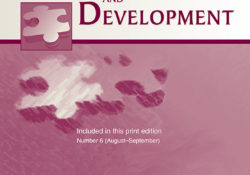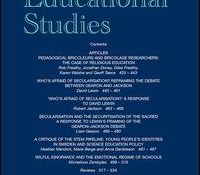tandfonline.com har udgivet en rapport under søgningen “Teacher Education Mathematics”: The Effects of COVID-19 on Young Children’s and Their Parents’ Activities at Home Link til kilde
Like this:
Like Loading...
tandfonline.com har udgivet en rapport under søgningen “Teacher Education Mathematics”: Scientist of the week: evaluating effects of a teacher-led STEM intervention to reduce stereotypical views of scientists in young children Link til kilde
Like this:
Like Loading...
tandfonline.com har udgivet en rapport under søgningen “Teacher Education Mathematics”: ABSTRACT ABSTRACT Relegated to the margins of the large body of research on ADHD and school is individuals’ own retrospective accounts of schooling. Drawing on multiple narrative interviews with nine young adults with ADHD in Sweden, the present study explores their experiences and reflections concerning their years in compulsory school. Despite variations in the gradient of decline, time in school was described as a slippery slope, with rapid deterioration in secondary school. Participation in sports and cultural activities outside school emerged as strong supportive factors. The expectations placed on the individual in the school context and relationships with teachers were described as key hurdles. In hindsight, school was perceived as a meaningless phase of their lives. The present findings nuance… Continue Reading →
Like this:
Like Loading...
tandfonline.com har udgivet en rapport under søgningen “Teacher Education Mathematics”: ABSTRACT ABSTRACT This article investigates how 9–13 years old pupils interpret activities involving the use of tablets in two Norwegian primary schools. The theoretical context draws on Goffman’s frame analysis and on research on young people’s digital literacy practices as socially situated meaning-making practices. Data was gathered through group interviews. The findings show that pupils framed activities involving tablets as engaging, enabling and playful, but also as teacher-directed and as challenging to their existing competences. Pupils’ framings were largely defined by what they expected to be of importance to their teachers but sometimes these also interrupted the teacher’s facilitation. The outcomes allow us to discuss the implications for pupils in developing digital competences, as a result of participation in a… Continue Reading →
Like this:
Like Loading...
eric.ed.gov har udgivet: In many respects, Hispanic families share the aspirations and anxieties of many other families nationwide: They are keenly focused on the role completing high school and going to college will play in their children’s future. Students and young adults see success in school and college as key to interesting work and a prosperous future, and most are optimistic about their prospects. Yet Hispanic parents, students and young adults also describe concerns, ideas, approaches and relationships with the public school system in ways that are sometimes distinctive. This brief, graphical summary, based on Public Agenda surveys taken over the last few years, lays out the chief differences and similarities. Summarized findings are taken from three different Public Agenda reports: (1) “Life after High School: Young People Talk about… Continue Reading →
Like this:
Like Loading...
eric.ed.gov har udgivet: This Child Development Associate (CDA) training module is intended to teach CDA interns how to provide classroom experiences that promote basic mathematics skills in preschool children. Knowledge of relationships of objects in space, grouping of objects, teaching of number names and counting, and the use of math games are discussed. The trainee is encouraged to learn how to plan and develop lessons, games, activities and environmental conditions to teach about objects and their location in space. Both teacher and trainee materials are provided in the module. Teacher materials consist of directions for pre-testing and field supervision, a resource person activity list and directions for each student activity. Trainee materials include pre- and post-tests, an activity record, a glossary, directions and 17 lessons. (Author/RH) Link til kilde
Like this:
Like Loading...
tandfonline.com har udgivet en rapport under søgningen “Teacher Education Mathematics”: ABSTRACT ABSTRACT The phenomenon of digital differentiation, or stark variations in ability to access Internet hardware and/or infrastructure, has been a feature of provision since its early days. This article explores the impact of digital differentiation on two groups of young people, in England and Germany. It is based on fieldwork that took place during the academic year 2018-2019, just before the global pandemic threw the issue of equality of Internet access into sharp relief. The article begins by describing the empirical design of the My Life Online project, including background, sampling, instruments, ethical aspects and the initial data analysis approach taken to ensure reliability and validity. It then develops a further analysis drawing on Halford and Savage’s hybrid Bourdieu/Actor… Continue Reading →
Like this:
Like Loading...
tandfonline.com har udgivet en rapport under søgningen “Teacher Education Mathematics”: ABSTRACT ABSTRACT Asking questions is an important way of acquiring information and knowledge and plays a significant role in a child’s learning processes. In this study, we examine what characterises the questions asked by children to their teachers in two kindergartens (4–6-year-olds) and six primary school classes (2nd–4th grade) when situated in a natural outdoor environment. Recordings are undertaken by means of action cameras and audio recorders. We also examine the contexts in which the questions are asked. We found that whereas the preschool children’s science topic questions mostly concerned subject matter (74–95%), the schoolchildren more often asked practical questions. Our findings indicate that providing the children with activities that open for the children’s own explorations of a variety of… Continue Reading →
Like this:
Like Loading...
eric.ed.gov har udgivet: This is a handbook intended for use at a 1-day conference for 170 seventh and eighth grade girls, their parents, counselors, and math/science teachers. It is meant to stimulate interest in exploring career options in mathematics and science related areas. Sections included are: (1) “Introduction”; (2) “Conference Objectives”; (3) “Promotion/Recruitment”; (4) “Conference Day Format” (presenting the procedures and handout materials of the 1-day program); (5) “Recommendations–Do’s and Don’ts”; (6) “Follow-up Activities” (providing materials for the activities); and (7) “Resources” (listing media and organizations). (YP) Link til kilde
Like this:
Like Loading...
tandfonline.com har udgivet en rapport under søgningen “Teacher Education Mathematics”: ABSTRACT ABSTRACT It is commonly assumed that the reason many young people do not participate in informal STEM education (ISE) is because they lack interest in STEM. This paper draws on survey (n = 1,624) and qualitative data (n = 36) with young people aged 11–14 to examine the ways in which science dispositions, demographic characteristics, ‘consumption’ of cultural practices and exclusion interact to produce unequal forms of STEM participation. Latent class analysis generated six groups within our quantitative dataset: three groups who infrequently participated in designed and community ISE practices (Underserved Tech Enthusiasts, Underserved Creatives and Underserved Scientists), one group who only participated in specific forms of ISE practices (Partly Served Generalists) and two groups who frequently participated across a broad range of… Continue Reading →
Like this:
Like Loading...






